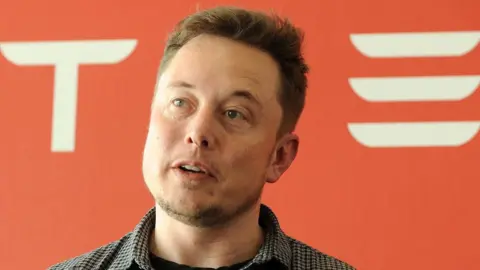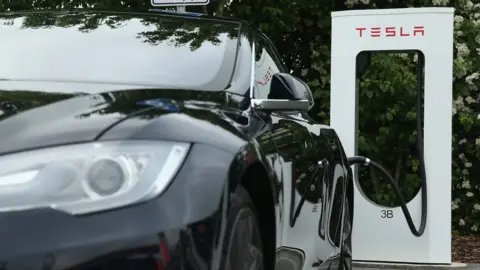Tesla: Elon Musk links long-term pay to company's growth
 Reuters
ReutersElon Musk, founder of the electric carmaker Tesla, has agreed a new salary package based on it becoming one of the world's most valuable companies.
His pay will be tied to growth in Tesla's stock market value, starting at $100bn (£72bn) and rising to $650bn.
To receive maximum remuneration, Tesla - now valued at $60bn - would have to be six times bigger than Volkswagen.
As well as growth in Tesla's market value, Mr Musk's pay will also be linked to 12 revenue and profit goals.
The plan needs to be signed off by shareholders in a vote in March.
Not driven by money
The proposal is similar to the structure of his last salary package, which was put in place in 2012.
Under that plan, Mr Musk was awarded stock options that vested only if the company continued to perform well and reach certain milestones.
The polymath entrepreneur has said many times before that he is not driven by money.
Tesla expects to pay him $49,920 in 2016-17, but he says he does not cash the cheques. Instead he lives off loans made against the value of his shares. The value of his stake in the business is $11.8bn.
Nevertheless, Tesla's new plan is quite a challenge.
The company continues to lose money and at one point last year was leaking almost $500,000 an hour.
Its future hangs on the Model 3 sedan, but Tesla has struggled to ramp up production of the most affordable electric car in its range.
The company made only 260 in the third quarter of last year because of what it called "production bottlenecks", when it had planned to build more than 1,500.
Strikingly, Musk's proposed remuneration plan no longer includes vehicle output targets, unlike his previous deal.
 Getty Images
Getty ImagesIf Mr Musk hits only a few of the proposed milestones, he will make billions in the value of his shares.
If he were to hit them all, and assuming that the company did not issue more shares over the next 10 years (which seems unlikely), Mr Musk would be in line to receive shares worth about $55bn.
As compensation plans go, Tesla's proposal is about as friendly to shareholders as they come.
If Mr Musk succeeds in hitting his benchmarks, the company's employees, including those who work on the factory floor, who get paid in both cash and stock, could become wealthy.
As with many of the big tech firms, succession planning is critical to confidence in the company.
The Tesla board requires Mr Musk to see through this 10-year plan. So, he is locked down to remaining chief executive, or executive chairman and chief product officer for the next decade.
This is significant. It allows for any incomer to take over the managerial control of the company whilst allowing Mr Musk to retain creative and strategic control of Tesla.
